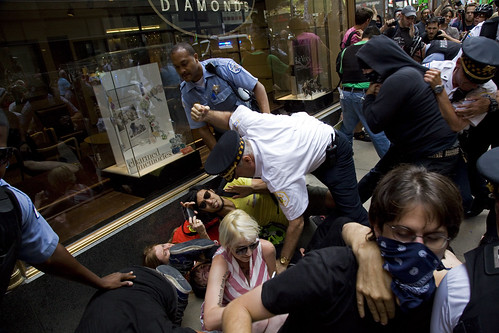| « Chicago Rail Workers Strike Against Unfair Labor Practices | City Tries to Improve Bicyclist Safety » |
Police Tue Aug 13 2013
Why Did Chicago Police Attack ALEC Protesters?

Photo by Justin Carlson, via The Anti-Media
Thousands of activists, union and faith group members, and concerned citizens rallied outside the Palmer House Hilton in downtown Chicago this past Thursday to protest the American Legislative Exchange Council (ALEC), whose 40th anniversary conference was being held inside the hotel.
Demonstrators picketed around the block for about an hour, then gathered at a soundstage to hear speakers including Rev. Jesse Jackson address the crowd. Closing remarks from a Chicago Federation of Labor representative thanked the Fraternal Order of Police for protecting the crowd and asked everyone to leave. A majority of union members, many from out-of-town, did leave at the CFL's request. However, a smaller group of anti-ALEC activists and citizens stayed put to continue on with the protest.
It was at this point that police began moving to break up the crowd, pushing and using barricades. After a brief standoff with activists chanting on one side of the barricade and police standing on the other side, police opened the barricade and surged into the crowd, knocking protesters to the ground. The commanding officer, Alfred Nagode, was seen repeatedly striking an activist in the face and head. Several others were beaten by police officers before a handful of arrests were made.
Aaron Cynic, an activist and writer at Chicagoist on hand at the anti-ALEC protest, witnessed police rush the crowd seemingly unprovoked. He said the beatings and arrests appeared to be targeted and pre-planned.
Laura Sabransky, another activist and anti-ALEC protester reports very little communication from police before they rushed the crowd. They did not get on a bullhorn ordering people to leave.
"Specific individuals were secretly selected as targets and attacked," David Orlikoff, an anti-ALEC activist and member of Occupy Chicago, alleges.
Orlikoff, himself, was targeted and arrested about half an hour later while he was leaving the protest. As he walked along the sidewalk on the south side of Monroe, an officer snatched him from behind, pulled him into the street, cuffed him, searched him, and took his phone.
"I was completely taken by surprise and shocked and had no idea what was happening to me," Orlikoff recounts.
He was not informed of his rights, and when he asked why he was being arrested, the arresting officer said it was for something he had done earlier, but would not elaborate. He was eventually charged with misdemeanor battery.
Orlikoff says police animosity towards anti-ALEC protesters was obvious throughout the incident. Nagode, who he describes as a "hot-head with a flaring temper," was heard repeatedly chastising protesters for being ungrateful that they had even been allowed to walk and chant. Once inside the police wagon, he witnessed police deny medical assistance to another arrestee, a female teacher, who was having a medical emergency and begging for the inhaler inside her bag that had been confiscated. Inside the jail, he heard police verbally berate other anti-ALEC arrestees.
So what is up with this violent police crackdown on protesters at Thursday's demonstration? To understand the police response, it is necessary to understand what anti-ALEC activists were there to protest.
For those unfamiliar with the group, ALEC is a tax exempt 501 (c)(3) organization made up of legislators, corporations, and foundations that works to promote conservative, free market, limited government ideals. It does so by drafting model bills and pushing them in state legislatures though its legislative members. ALEC's impact on public policy goes well beyond simple lobbying. In effect, unelected corporate representatives have actually finagled positions of power within legislatures akin to those of elected representatives.
John Nichols, Washington correspondent for The Nation magazine, has criticized ALEC as a "collaboration between multinational corporations and conservative state legislators," waging a "savage assault on democracy."
The group boasts around 2,000 corporate members and 300 legislative members across the country. Their model legislations include right to work laws designed to do away with minimum wage, laws to create tax havens for corporations and wealthy interests, laws to push public funds from public schools to private charter schools, laws to prevent class action lawsuits from being filed against corporations and employers, laws to repeal mandated worker benefits, laws to eliminate pollution regulations and environmental protections, laws to increase for-profit prison operations, and numerous others. The controversial "stand your ground" law is also an ALEC brainchild.
Many believe that Chicago police cracked down on anti-ALEC protesters because their message directly defies the pro-business agenda of political players calling the shots in this city, chiefly Mayor Rahm Emanuel. Mayor Emanuel has notoriously embraced many of ALEC's conservative policies pushing to expand privatization and corporate reach within the city.
Cops do snatch and grab arrests to repress individuals engaged in activities confronting the legitimacy of the dominant hierarchy, Orlikoff explains. Charges distract from those activities. Police target organizers and individuals involved with the activist community, attack them, and arrest them on made-up charges to undermine the viability of political movements. Its easy for police to do and makes it much harder for protesters to get back on the street without risking harsher punishment.
Because police are the "frontline foot-soldiers" of the existing power structure, Orlikoff laments, "Anything that challenges that existing structure elicits a dangerous response from law enforcement."
Of course, historically and presently, repressive police tactics are nothing new for Chicago's activist community. From the first round of Occupy Chicago mass arrests back in October of 2011, to mass arrests surrounding the NATO Summit in May 2012, to last week's anti-ALEC protest crackdowns, the Chicago Police Department appears to have a nasty habit of targeting and violating the constitutional rights of protesters based on their proletarian political beliefs.











